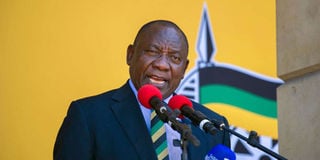Premium
No-confidence vote on South Africa's Ramaphosa put on ice

South African President Cyril Ramaphosa.
What you need to know:
- The vote is sponsored by the African Transformation Movement, backed by former President Zuma and allies of the Gupta family.
A proposed no-confidence motion against South African President Cyril Ramaphosa has been moved to February next year to allow for a ruling on whether the vote should be held in secret ballot.
Behind the African Transformation Movement (ATM), one of the smallest parties in Parliament, is the ongoing battle within the ruling African National Congress (ANC) for its ‘heart and soul’ – and the control of the country.
The ATM was formed in 2018 with the backing of the Council of Messianic Churches in Christ (SACMCC), which boasts millions of congregants.
The party’s chief of policy and strategy is Mzwanele ‘Jimmy’ Manyi, former government spokesman and ‘owner’ of the defunct ANN7 TV news channel controlled by the notorious ‘Gupta family’, which is heavily implicated in state capture corruption.
The ATM is widely seen as a lobbying platform for former President Jacob Zuma and is on the side of the ANC’s factional divide in which President Ramaphosa and some of his key ‘clean-up campaign’ anti-corruption ministers are top targets of Zuma loyalists. The ATM has just two out of 400 MPs and two out of 430 regional government representatives.
Despite its few elected representatives, the ATM’s moves are much more significant in the context of the tussle for control of the ANC and SA’s future, which is under way between those still aligned to Zuma and those seeking to root out corruption and improve governance, supporting Mr Ramaphosa and his team.
The ATM, following what another small party did when Zuma was facing one of his last no confidence debates, has called for a secret ballot.
That issue has been taken to the courts for a hearing in early February after the Speaker refused the ATM’s request for such a vote.
The ATM move is meant, as one analyst put it, “to pry some daylight between Ramaphosa and some of his parliamentary caucus”, the idea being that this will weaken the President’s grip on the party.
Recently, Zuma has had repeated step-backs, including putting himself in line for contempt and other charges for walking out under summons from Deputy Chief Justice Raymond Zondo’s state capture commission.
His other acolytes and allies have also found themselves either under being questioned by Zondo, or facing corruption charges as Ramaphosa’s ‘clean-up campaign’ has finally borne fruit.
Zuma’s chief ally within the ruling party’s hierarchy, ANC secretary-general Ace Magashule, has also been charged with corruption related to his time as premier of the graft-riven Free State province.
While the move to weaken Ramaphosa is almost certain to fail, especially as the official opposition Democratic Alliance will not support it, it is seen as a prelude to efforts by some within the ANC to oust Ramaphosa.
Next May the ANC is scheduled to hold its National General Council at which some 3,000 delegates are set to assess the party’s performance.
The pro-Zuma element has openly said that it will use that gathering to kick out Ramaphosa, similar to the 2007 ouster of former President Thabo Mbeki.
In terms of existing ANC policy, Magashule, along with others implicated in wrong-doing and who have been formally charged, should ‘step aside’ from party and government positions until cleared or sentenced.
But Magashule, controller of the ANC’s day-to-day operations and organisational structures, has refused to resign, and his contingent in the party is fighting back to prevent him from being sidelined.
The no-confidence vote, should it go ahead in secret – which seems impossible as Parliament meets in hybrid style with many MPs participating remotely – is considered important in that it will demonstrate whether there are a significant number of sitting ANC MPs prepared to vote against their nominal leader.





